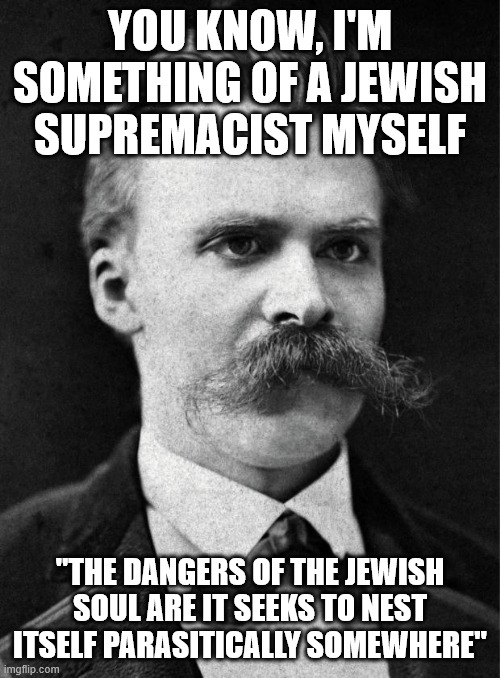By some luck, I found that Andrew Joyce has a very detailed article on this very question of Nietzsche's attitudes toward the Jews. It is a review of Robert Holub's 2015 book Nietzsche’s Jewish Problem: Between Anti-Semitism and Anti-Judaism which is presumably the most thorough mainstream treatment of the topic.
https://www.theoccidentalobserver.net/2 ... ne-of-two/
https://www.theoccidentalobserver.net/2 ... wo-of-two/
One piece of evidence Joyce mentions but that Dalton doesn't get into is that early on, Nietzsche was devoted to Wagner who was legendary anti-Semite (see for example his 1850 essay "Jewry in Music"). This by itself is circumstantial evidence of his sympathies, at least early on. There was even an incident in 1872 where Nietzsche had included a brief critical comment about Jews in a draft of his lecture notes.
Wagner's wife Cosima told him to cut out the part about Jews.This is the most serious question of our art: and anyone who, as a Teuton, does not understand the seriousness of this question, has fallen into the Socratism of our times, which, to be sure, is neither capable of producing martyrs, nor speaks the language of the wisest Hellene. This Socratism is the Jewish press: I’ll say no more.
CounterpointsDo you really understand me? Don’t mention the Jews, and especially not en passant; later, when you want to take up this gruesome fight, in the name of God, but not at the very outset, so that on your path you won’t have all this confusion and upheaval. I hope you don’t misunderstand me: you know that in the depths of my soul I agree with your utterance. But not now and not in this way.
Just because we can find a couple of "based" quotes doesn't mean we can jump to conclusions here as there are also comments that seem to run in the other direction. A commonly cited passage is section 251 of Beyond Good and Evil. Below is part of it. (Dalton cites this passage but does not quote or address the parts that sound more favorable on the Jews).
It is certain that the Jews, if they desired—or if they were driven to it, as the anti-Semites seem to wish—COULD now have the ascendancy, nay, literally the supremacy, over Europe, that they are NOT working and planning for that end is equally certain. Meanwhile, they rather wish and desire, even somewhat importunely, to be insorbed and absorbed by Europe, they long to be finally settled, authorized, and respected somewhere, and wish to put an end to the nomadic life, to the "wandering Jew",—and one should certainly take account of this impulse and tendency, and MAKE ADVANCES to it (it possibly betokens a mitigation of the Jewish instincts) for which purpose it would perhaps be useful and fair to banish the anti-Semitic bawlers out of the country.
https://www.gutenberg.org/cache/epub/43 ... mages.html
It seems clear that Nietzsche does not think of himself as being included among "the anti-Semites." At the same time, though, some of Nietzsche's comments where he says something favorable sounding about Jews potentially border on "accidental" anti-Semitism, i.e., certain forms of "praise" may imply or reinforce some anti-Semitic stereotypes about Jewish power.
https://codohforum.com/viewtopic.php?t=225
There are also private letters that are sometimes referenced.
http://www.thenietzschechannel.com/corr ... t-1887.htm
It now remains to thank you for your well-meaning assumption that I have not been "led to my warped judgments by any social considerations"; and perhaps it will serve your peace of mind if finally I tell you that among my friends, I have no Jews. But also no anti-Semites. (to Theodor Fritsch, 1887)
Recently a Mr. Theodor Fritsch from Leipzig wrote to me. There is no more impudent and stupid mob in Germany than these anti-Semites. I gave him in thanks by letter a real beating [Fußtritt]. This blackguard dares to mouth the name Z[arathustra]! Disgust! Disgust! Disgust! (Nietzsche's Notebooks, 1886-1887)
I am returning to you the three issues of your correspondence sheet, thanking you for your confidence which you permitted me to cast a glance at the muddle of principles that lie at the heart of this strange movement. Yet I ask in the future not to provide me with these mailings: I fear, in the end, for my patience. Believe me: this abominable "wanting to have a say" of noisy dilettantes about the value of people and races, this subjection to "authorities" who are utterly rejected with cold contempt by every sensible mind (e.g., E. Dühring, R. Wagner, Ebrard, Wahrmund, P. de Lagarde who among these in questions of morality and history is the most unqualified, the most unjust?), these constant, absurd falsifications and rationalizations of vague concepts "Germanic," "Semitic," "Aryan," "Christian," "German" all of that could in the long run cause me to lose my temper and bring me out of the ironic benevolence with which I have hitherto observed the virtuous velleities and pharisaisms of modern Germans.
And finally, how do you think I feel when the name Zarathustra is mouthed by anti-Semites? ... (to Theodor Fritsch, 1887)
The anti-Semites are enamored with Zarathustra, "the divine man"; and there is a particular anti-Semitic interpretation of it, which made me laugh greatly. Incidentally, I have made "in competent quarters" the suggestion a thorough list be made of German scholars, artists, writers, actors, virtuosos of entirely or half-Jewish descent: that would make a good contribution to the history of German culture, and criticism of it. (In all this, between ourselves, my brother-in-law is not involved at all; my dealings with him are very polite, but aloof, and as infrequent as possible. His undertaking in Paraguay is thriving, by the way; my sister is too.) (to Franz Overbeck, 1887)
For some context, his sister's husband was staunch anti-Semite.Now it has gone so far that I have to defend myself tooth and nail against those who confuse me with these anti-S[emitic] canaille; after my own sister, my former sis[ter], like Widemann more recently, has given the impetus to this most disastrous of all confusions. After I actually read the name Z[arathustra] in the Anti-S[emitic] Correspondence, my patience came to an end I am now in a state of self-defense against the party of your husband. These accursed antics of the anti-Semites shall not sully my ideal!! (to his sister, Elizabeth Förster Nietzsche, 1887)
All Told
This is a surprisingly complicated question, and it doesn't seem like a definitive conclusion will be possible. My best (inexpert) guess is that he probably had some Jew-critical opinions early on, especially during his pro-Wagner phase. Later on, while his views on Jews may not have been exactly "politically correct" by modern standards, it does not seem he was especially anti-Semitic given the era and given his antipathy toward religion in general. And it's safe to say he butted heads with Fritsch and other anti-Semites of his day.
Addendum: Kaufmann and Levy
As an afterthought, I will mention that Jews have played a major role in interpreting Nietzsche in the English-speaking world. Jewish scholar Walter Kaufmann was a major translator and biographer of Nietzsche and had considerable influence over the interpretations of Nietzsche after WWII. Interestingly, prior to Kaufmann, there was a different Jew, Oscar Levy, who edited the first complete English editions of Nietzsche's works in 1909-1913. One of the main translators who worked with Levy was the far-right intellectual Anthony Ludovici. They were apparently quite close. At a glance, I do not detect much of a Jewish agenda behind Levy's efforts. I can't say the same for Kaufmann, however. Kaufmann's thing seems to have been to distance Nietzsche from the far-right associations of the Third Reich era and to package him to be more amenable to the liberal sensibilities of post-WWII America. To some extent, Kaufmann was probably correct that the interpretations of Nietzsche after his death were often not very reflective of Nietzsche himself. But I think it was inevitable that some of Nietzsche's ideas (the superman, etc) would be blended with parallel Darwinian and racialist concepts even if Nietzsche himself did not really draw such connections.
Counter Currents sells some works of Ludovici
https://counter-currents.com/product/th ... d-edition/
https://counter-currents.com/product/co ... -feminist/

